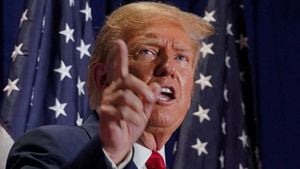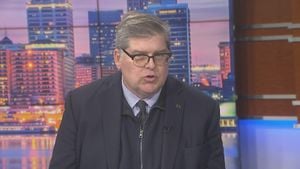Donald Trump’s recent appointments may signal a dramatic shift in U.S. foreign policy, especially concerning the Middle East. With the announcement of key figures like former Arkansas Governor Mike Huckabee and real estate developer Steve Witkoff assuming pivotal roles, analysts are debating the potential consequences for American diplomacy and relations with Israel and the Palestinian territories.
Huckabee, who has been named as the nominee for U.S. ambassador to Israel, has openly aligned himself with pro-settlement policies. Shortly after his appointment, he emphasized his commitment to implement Trump’s policies, stating, "I won't make the policy. I will carry out the policy of the president.” Huckabee’s previous advocacy for the relocation of the U.S. embassy to Jerusalem and the recognition of the Golan Heights as Israeli territory resonates well with the Israeli right wing but faces vehement opposition from Palestinians.
His appointment has been received positively by notable far-right Israeli leaders, including Finance Minister Bezalel Smotrich and National Security Minister Itamar Ben-Gvir. The enthusiasm from these ministers reflects their hopes for continued U.S. support for Israel’s expansionist policies, particularly with regard to West Bank settlements. The backdrop of these confirmations is the currently fragile situation surrounding the Israel-Gaza conflict, where Huckabee's approach remains to be seen.
Huckabee's positions are not just rhetorical flourishes; they align with the policies established during Trump’s first administration, which were sharply criticized for dismissing the legality of Israeli settlements. His earlier statements include claims such as, "There’s no such thing as settlements. They’re communities, they’re neighborhoods, they’re cities," which are music to the ears of the Israeli settlement movement.
On the other hand, Witkoff’s selection as special envoy to the Middle East has raised eyebrows due to his lack of traditional diplomatic experience. A close personal associate of Trump, Witkoff has spent significant time golfing with the former president, sparking concerns about whether he can effectively navigate complex international relations, particularly with Iran and the issues surrounding Gaza.
Given his lack of foreign policy background, there is uncertainty surrounding Witkoff’s effectiveness. His past comments suggest he supports Trump’s proactive strategies, asserting, “With President Trump, the Middle East experienced historic levels of peace and stability.” Still, many question how effectively he’ll tackle the multifaceted political realities of the region.
The wave of appointments to Trump’s team draws parallels to his past administration, showcasing individuals with similar ideologies. Former Mideast envoy Jason Greenblatt and Jared Kushner, linked to Trump's real estate ventures, also lacked extensive diplomatic backgrounds yet played significant roles during the previous administration.
But what could potentially emerge from this new cohort of advisors? Analysts foresee continued support for Netanyahu's government and possibly increased momentum toward annexation of the West Bank, as expressed by Smotrich, who recently declared, “2025 will be the year of sovereignty” for the area.
While Israeli ministers view Huckabee's appointment as favorable, Palestinian leaders, including Mustafa Barghouti, voice alarm. Barghouti warns, “You can image the reaction of other powerful countries if annexation becomes legal and acceptable.” This is indicative of the broader sentiment among many who fear for the existing international order should annexation proceed.
The appointments may also widen the rift between American and Israeli Jews. Liberal Jewish groups, who largely oppose expansionist policies toward the Palestinian territories, have responded with dismay to Trump's choices. Trump’s administration is criticized for promoting officials who might exacerbate hostilities within the region and push the U.S. away from advocating for international law.
Matt Brooks of the Republican Jewish Coalition remarked on the pro-Israel nature of the appointments, labeling them “a true dream team” for those favoring strong U.S.-Israel relations. Yet, this dream team seems to overlook the perspective of millions who advocated for Palestinian rights and diplomatic solutions to long-standing disputes.
Concerns about the potential impact on U.S. relations with Muslim communities are mounting, especially among those who previously rallied around Trump, hoping for substantial reform from the Biden administration. Many are feeling disillusioned, believing they were misled by Trump's campaign during outreach efforts.
Rabiul Chowdhury, part of Muslims for Trump, articulated this sentiment, pointing out the disconnect between Trump's promises and his actual cabinet selections. With Huckabee and Witkoff now at the helm of Middle Eastern policy, the repercussions for U.S. relations with Arab nations could grow increasingly strained.
Many political analysts argue this troubling shift means the feasibility of returning to dialogue surrounding long-term solutions, such as the two-state plan, appears to be growing ever more distant. Historically, negotiations aimed at fostering peace have been rooted deep within equality and adherence to international law, but statements from Huckabee and others indicate opposition to such approaches.
Recent polling reveals significant opposition to Trump’s appointments among American Jews, with many believing Trump's firm stance with Israel overlooks core issues of rights and sovereignty for Palestinians. The 2024 U.S. election showcased similar sentiments, with exit polls reflecting substantial support for candidates more aligned with traditional diplomatic policies.
Jeremy Ben-Ami, president of the liberal Zionist group J Street, expressed grave concerns stating, "There’s a big, big philosophical question brewing here," hinting at potential fractures within the Jewish community as Trump consolidates pro-Israel, hardline stances within his administration.
Looking forward, the international community now finds itself bracing for the impact of Trump’s picks and their overarching desire to align closely with Israeli policies. The balancing act between supporting Israel’s interests and advocating for fair treatment of Palestinians will shape legislative dialogues and diplomatic correspondence for the foreseeable future.
Year 2025 may arrive, heralding bold moves toward annexation and shaping ambitions within the settler community, which, as long as Huckabee and Witkoff are present, seems ever more likely to gain traction. The real question now is not merely what those policies will be, but how the global audience, including allies and adversaries of Israel, will respond to these significant shifts.
It appears possible the geopolitical canvas of the Middle East may undergo consequential changes under Trump’s renewed leadership, positioning his administration to embrace more incendiary policies and potentially deepen existing divides.



